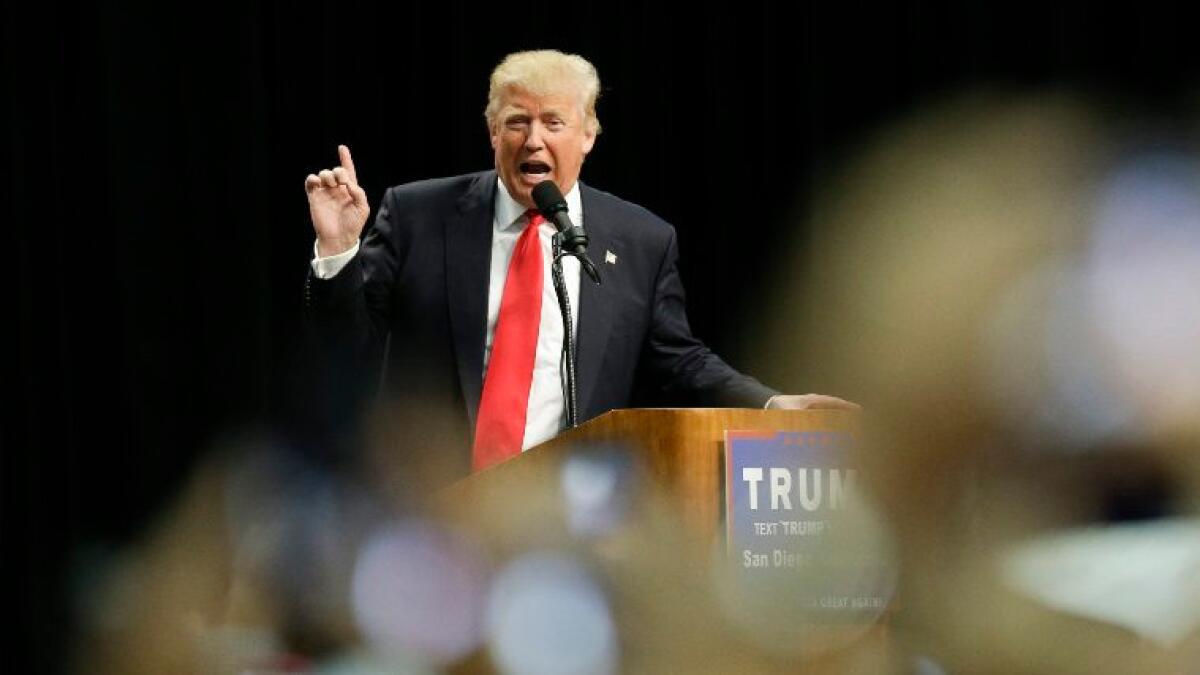Opinion: The other slur Trump hurled at a federal judge

Republican presidential candidate Donald Trump speaks during a rally in San Diego on Friday.
Donald Trump is rightly being savaged for lashing out against the federal judge who is presiding over a class-action suit against Trump University. Most of the criticism has focused on Trump’s comment at a San Diego rally that U.S. District Judge Gonzalo Curiel “happens to be, we believe, Mexican, which is great.” (The judge was born in Indiana.)
Typical was this reaction from Benny Agosto Jr., the vice president of the Houston Bar Assn: “When you put down an American-born federal judge because his background is Mexican, it shows the lack of character and demeanor of the candidate using that rhetoric.”
Trump’s mention of Curiel’s ethnicity – even with the appended “which is great” – was outrageous. Less remarked on is another way in which he impugned the judge’s integrity. In the same rant, Trump said: “We’re in front of a very hostile judge. The judge was appointed by Barack Obama.”
I wouldn’t equate the offensiveness of the two remarks, because a gratuitous reference to Curiel’s Mexican ancestry was especially ugly in light of Trump’s previous comments about Mexicans. But the implication that the judge was biased because he was appointed by Obama is also a slur.
The difference is that Trump was invoking an idea that has gone mainstream in journalism – that federal judges are pawns of the presidents who appoint them. This idea is propagated by news stories that reflexively identify a judge by mentioning which president appointed him.
As I wrote in 2014: “Whether a judge in a headline-making case was nominated by a Republican or a Democrat is a fact, but it’s not the same sort of fact as the D in “Sen. Dianne Feinstein (D-Calif.)” or the R in “Rep. Paul Ryan (R-Wis.).”
It isn’t just journalists who make this connection. Politicians also believe that judges are, or should be, robots programmed by the presidents who choose them. Sen. Bernie Sanders has indicated that he would appoint to the Supreme Court only a nominee “who will make it crystal clear . . . that he or she will vote to overturn Citizens United.” Erstwhile Republican presidential candidate Sen. Ted Cruz, who supported John G. Roberts Jr.’s appointment to the high court, had second thoughts after Roberts voted to uphold the legality of Obamacare.
Obviously presidents try to nominate judges – especially for appellate courts – who share their general philosophy. But once on the bench, judges and justices have an obligation to call cases as they see them, whether or not the outcome might please the president who appointed them (or his or her party). Examples abound of Supreme Court justices who bit the hand that submitted their nominations.
Trump deserves the grief he is getting for referring to Judge Curiel as a “Mexican.” But he also crossed a line in suggesting that the judge was hostile because he was appointed by Obama. Would it follow that a Democrat could question the impartiality of a judge appointed by President Trump? Let’s hope we’ll never have to test that proposition.
Follow the Opinion section on Twitter @latimesopinion and Facebook
More to Read
A cure for the common opinion
Get thought-provoking perspectives with our weekly newsletter.
You may occasionally receive promotional content from the Los Angeles Times.







